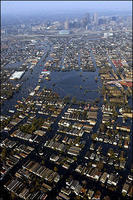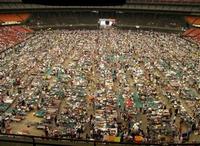Thursday, September 01, 2005
In 1927 the  fact, socio-economic results was the mass migration of blacks to northern cities like
fact, socio-economic results was the mass migration of blacks to northern cities like
Fast forward to 2005. Reports place perhaps as much as 80% of the city of
To watch what is happening on TV (or perhaps more appropriately, sadly, is NOT happening) I’m left with various emotions. First, it’s obliviously a horrible situation that no one really expected. Everyone knew it COULD happen, but no one really expected it. I remember reading a National Geographic article from last year (October 2004, p. 89) that explained southern
It’s unfortunate the city has little effective leadership or suitable plans for such a catastrophe. This is wholly apparent. A city that generally buries people above ground because of the water table, sits at about 8 feet below sea level, and it bounded by a river, a lake, and a large Gulf, should be prepared for a flood. And it should be prepared for a catastrophic flood. Maybe 80% of the city is a bit extreme to prepare for, but if they were prepared for a 40% flood rate, it seems a lot of what has transpired over the last few days would have been averted.
There are reports that rescue workers and police officers have been fired at, stores are being violently looted, bodies are floated in the water. This isn’t third world country, yet my TV is blanketed with images that suggest just that. The National Guard seems to have come in extremely ill-prepared; the
Now you have inhabitants, the majority of which problem came out of public housing, wandering aimlessly around the town. Maybe they’ll get on a bus to the Houston Astrodome. Maybe not. They don’t really have a home. There was a woman who complained that she hadn’t had a “hot meal” in 4 days. Hmm. If you don’t count the pizza I ordered on Tuesday, neither have I. And I haven’t even been through a hurricane. Other reports suggested that the New Orleans Superdome had turned into a bowl of urine and feces.
around the town. Maybe they’ll get on a bus to the Houston Astrodome. Maybe not. They don’t really have a home. There was a woman who complained that she hadn’t had a “hot meal” in 4 days. Hmm. If you don’t count the pizza I ordered on Tuesday, neither have I. And I haven’t even been through a hurricane. Other reports suggested that the New Orleans Superdome had turned into a bowl of urine and feces.
People pissing off the rafters and defecating on the bathroom floor. Who does that sort of thing? I also liked how people lined up to get into the superdome without any luggage. If I’m going into a shelter, I might want to bring something to eat, a pillow, a blanket, some clothes, a toothbrush. Maybe even—gasp—some soap. It’s basically like camping. But who am I kidding. If you didn’t bring it, I’m sure you can just steal it from some storefront. No worries. It’s disgusting. This whole situation is disgusting.
Optimistic forecasts suggest that bringing electricity and running water into the city will takes weeks, maybe even 3 months. Homes, neighborhoods, businesses are gone. Whole families are probably gone. And thousands of residents will be displaced to cities like Houston and Dallas to live for the time being. I’m not sure what percent will actually return, considering there won’t be much to return to. Maybe they will start a new life in a
I donated to Catholic Charities’ Hurricane Katrina relief fund today. I don’t recall the last time I made a donation to a major cause. I know some people (are and will) abuse the system. But whatever corners those people may cut, they will have much larger issues to face in their lives soon. Life in
Following the catastrophe, would you sit around and wait? Now, I am not referring to those trapped by waters in their homes or trees or place of relative danger. I'm referring to those outside and inside of the superdome and other makeshift shelters. At what point, would you get tired of waiting and either a) start walking out of town b) begin looting, as it is an obvious choice or c) begin helping yourself and those around you.
You must also recall the socio-economic conditions of what a number of the majority African-American residents were in that city.
I should know at least a little bit, being born and raised in the New Orleans metro area. My folks are still there in the area, in fact.
If you have been to the city before, travel there once more. But this time don't see the tourist stops or the French Quarter. Those places one knows very well since it is the visible face of the city. Rather, go to the slums---and there are many of them--or what the government likes to euphemistic term "housing projects." This is where the poor are (or, at least before Katrina, were) massed in huge areas of destitute poverty.
Before you even aim to speak on the sheer gravity of the subject and the problems of the city you termed "a big mess," I highly suggest that you read a very well written book by Douglas Brinkley on the matter...and what surrounds it. The book is called The Great Deluge. Read it and get others to read it. It will open your eyes to the ills that affect the great city of New Orleans.
